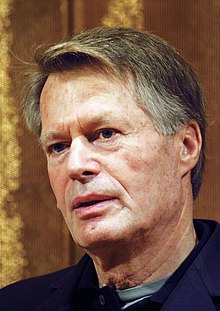J. M. G. Le Clézio
| J. M. G. Le Clézio | |
|---|---|
 |
|
| Born | Jean-Marie Gustave Le Clézio 13 April 1940 Nice, France |
| Occupation | Writer |
| Nationality | French |
| Ethnicity | Breton/French |
| Citizenship | French and Mauritian |
| Period | 1963–present |
| Genre | Novel, short story, essay, translation |
| Subject | Exile, migration, childhood, ecology |
| Notable works | Le Procès-Verbal, Désert |
| Notable awards |
Nobel Prize in Literature 2008 |
Jean-Marie Gustave Le Clézio (French: [ʒɑ̃ maʁi ɡystav lə klezjo]; born 13 April 1940), usually identified as J. M. G. Le Clézio, is a French-Mauritian writer and professor. The author of over forty works, he was awarded the 1963 Prix Renaudot for his novel Le Procès-Verbal and the 2008 Nobel Prize in Literature for his life's work, as an "author of new departures, poetic adventure and sensual ecstasy, explorer of a humanity beyond and below the reigning civilization".
Le Clézio's mother was born in the French Riviera city of Nice, his father on the island of Mauritius (which was a British possession, but his father was ethnically Breton). Both his father's and his mother's ancestors were originally from Morbihan, on the south coast of Brittany. His paternal ancestor François Alexis Le Clézio fled France in 1798 and settled with his wife and daughter on Mauritius, which was then a French colony but would soon pass into British hands. The colonists were allowed to maintain their customs and use of the French language. Le Clézio has never lived in Mauritius for more than a few months at a time, but he has stated that he regards himself both as a Frenchman and a Mauritian. He has dual French and Mauritian citizenship (Mauritius gained independence in 1968) and calls Mauritius his "little fatherland".
Le Clézio was born in Nice, his mother's native city, during World War II when his father was serving in the British Army in Nigeria. He was raised in Roquebillière, a small village near Nice until 1948 when he, his mother, and his brother boarded a ship to join his father in Nigeria. His 1991 novel Onitsha is partly autobiographical. In a 2004 essay, he reminisced about his childhood in Nigeria and his relationship with his parents.
...
Wikipedia
